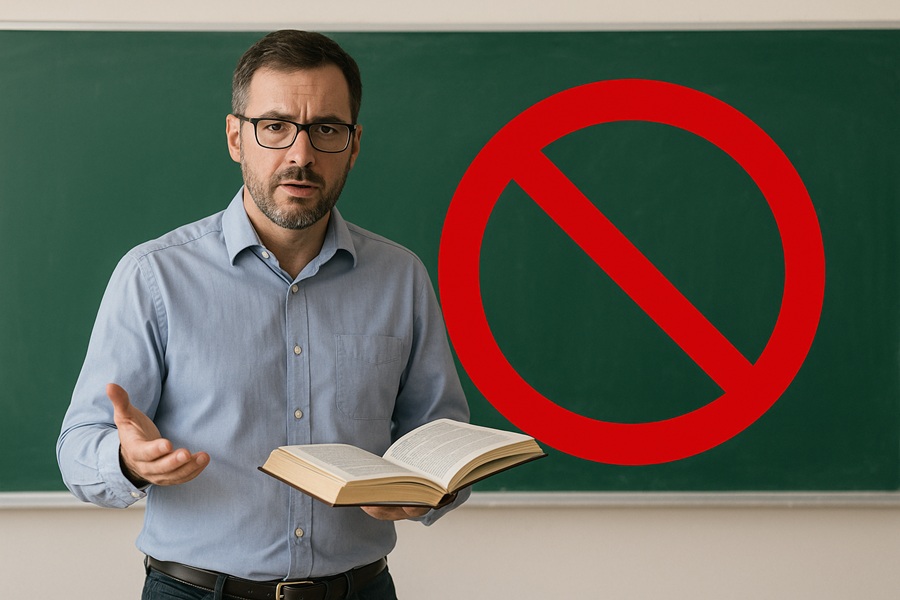- 9 de October de 2025
- No Comment
- 6 minutes read
Are we teachers or what on earth are we?

Image created using AI
When the teaching profession has little left of teaching

.
.
To be a teacher and yet have no time to prepare lessons, to design original materials that might genuinely benefit our pupils, to keep abreast of our own field, to pursue the training that helps us become better professionals—in short, to lack the time to do the very thing that defines us—is an anomaly that has turned today’s schools into dystopias.
And it is within this dystopia that we live—those of us who, at some point in our academic lives, dared to imagine teaching as a vocation that dignified us precisely because it allowed us to share knowledge, to pass it on, and thus to shape possible worlds into better ones.
Let us not deceive ourselves, nor be taken in by the fashionable mantra—Mar Romero’s, for instance—that school is not a place to learn but a place to live, as though living and learning were somehow mutually exclusive. Or worse still, that school is for playing, seems preferable, and it is for this very reason that so many teachers abandon the profession.
We now devote more hours to filling in digital forms, replying to emails, recording every conceivable event—however trivial (a pupil going to the lavatory, filling a water bottle, grazing a knee and asking for an ice pack, retrieving the forgotten sandwich delivered by a parent or grandparent)—than we do to teaching itself.
To ask whether we are truly teachers is, at times, a more rational exercise than Descartes’ own methodical doubt.
A sense of dislocation and disorientation often invades our psyche: one no longer knows whether one is in a classroom or in The Matrix. Might I be a teacher only in my imagination? I look around and see nothing to prove I am in a classroom. Where is the blackboard? Where is the chalk? And worse still, where are the textbooks? Could it be that, in this finite universe of finite resources, textbooks were the first to run out? Or have they been consigned to the flames, Fahrenheit 451-style?
We call on the Department for Education and Vocational Training to revisit the writings of Luri and so many others who never tire of reminding us of the value of physical presence in the classroom. For what is a classroom without a blackboard, without chalk, without textbooks? Are these not the very elements that constitute, that qualify, that define it?
No one would imagine a football pitch without goalposts, yet we seem increasingly ready to imagine a classroom without profs. And the unthinkable is on the verge of becoming reality.
Is the disdain for our profession merely a convenient way of justifying the salaries we are paid? With due respect, everyone knows that a monitor, workshop leader or youth worker earns less than a teacher, and does so because the qualification required is lower. Is this the plan—to downgrade our profession in order to cheapen it?
You may pay the so-called experts who surround you, but you silence and disparage the voices of those who enter the classroom each morning and must solve the very problems you create.
After the daily whirlwind, one somehow finds solid ground again, seizing the fleeting interstices between bureaucratic tasks—a smooth, unmarked, open space in which to be fully oneself: a transmitter of knowledge.
Today, you will meet Socrates—his thought and his death—through the hand and dialogues of his disciple Plato, and we shall once again attempt to improve the species.
Some of those you consider irrelevant—Plato himself, for instance—remind us that aesthetics walks hand in hand with ethics, that the good is also the beautiful, and the beautiful the good. Yet the new pedagogies seem determined to ensure that no pupil in search of enlightenment ever discovers this—that we deny them even the chance to approach truth. We may live on indefinitely, yet condemned to eternal ignorance: a life perhaps comfortable, but relentlessly dull.
You embody ugliness itself, striving to impose this anti-aesthetic vision wherever your power extends. Yet you consistently forget that we are rational beings, that reason illuminates us, and that pupils have an inalienable right to be enlightened—unequivocally—through the guidance of their teacher.
Source: educational EVIDENCE
Rights: Creative Commons

